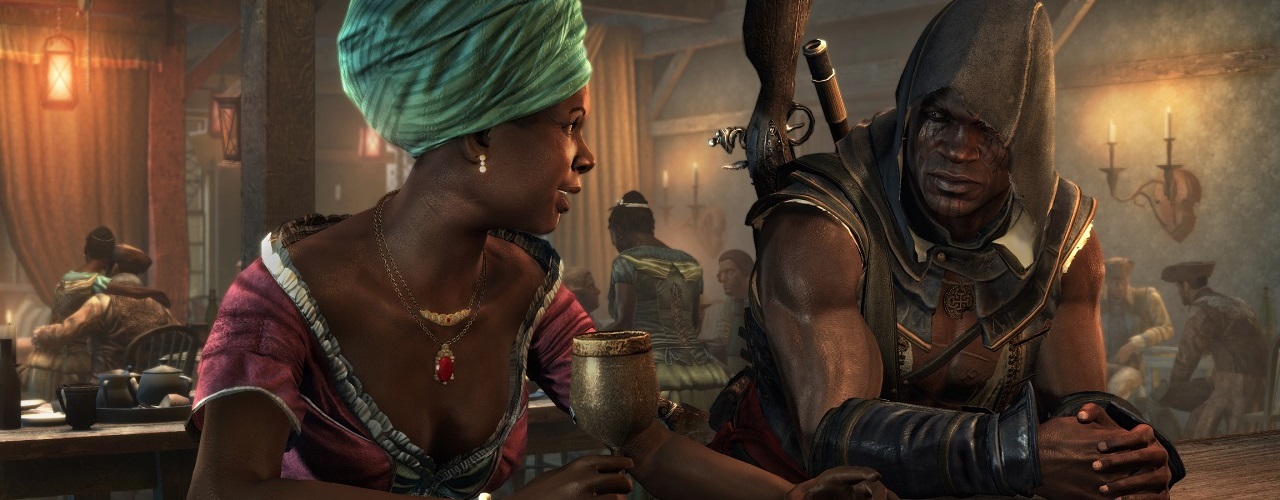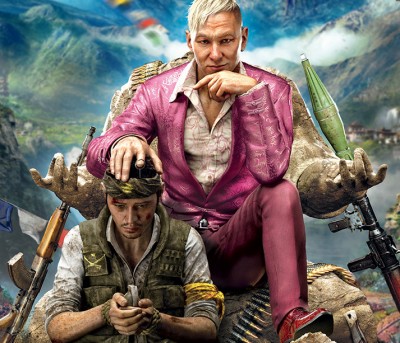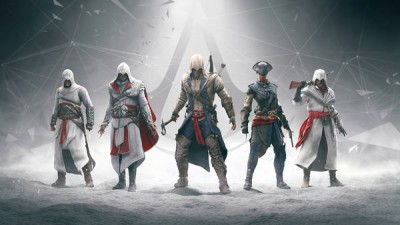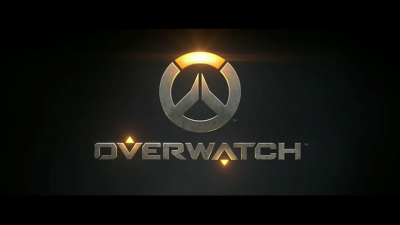Ubisoft is no stranger to including characters of diverse backgrounds in its games. The Assassin’s Creed series generally has an excellent track record: Adéwalé from the excellent Assassin’s Creed IV: Black Flag for instance, is a rare example of a Trinidadian black character – in fact, he’s the only example we can think of.
Ubisoft went one further and made him a playable character in the Freedom Cry DLC, not in spite of the theme of slavery (that’s a part of the game’s historic setting), but because of it. Some might argue that the developer’s handling of the touchy content didn’t do the slavery issue justice, but few would deny that it was, by and large, tastefully done rather than exploitative.
Yet despite the publisher being at the forefront of tasteful, diverse character depictions, the general reaction coming out of E3 is a negative response to the lack of diversity in Assassin’s Creed: Unity - the newest AC game that features 4 player co-op but no female character skins. Hardly a word is said of the groundbreaking ethnically Indo-Asian lead (who happens to skirt the studious/geeky/terrorist stereotypes) in Far Cry 4, Ajay Ghale.
To be fair, Ajay’s heritage places him right between being a hero players can identify as Indo-Asian and East Asian, so it might be a misnomer to call say he is strictly Indo-Asian. But that misses the point: that Ajay’s character is groundbreaking because he can be considered Indo-Asian at all. The fact that he can also be considered East Asian as well simply widens his appeal and makes him all the more noteworthy. So why is no one standing up and taking notice?
Maybe it’s because Ajay’s inclusion isn’t new news, right? Well, actually Far Cry 4 has been in the news for its depiction of race before E3: Ubisoft was panned both by those concerned the initial reveal was homophobic, and those that thought it racist. This in turn prompted the publisher to come out and clarify the races of the characters in the game.
Perhaps those internet commentators and journalists had good reason to be initially concerned. But it isn’t their trigger-happy vocal response to the situation that’s problematic; it’s what those voices are saying about the issue now.
Where are those same people who vocally decried Far Cry 4? Why aren’t they busy talking about what is the first major inclusion of an Indo-Asian lead in a big budget AAA game? For an industry that claims to care so intently about diversity, it’s amazing how little time it spends celebrating it.
Now maybe there just aren’t many Indo-Asian writers out there to celebrate this “victory”. But in an industry where straight, white men routinely go out of their way to fight for great black/gay/female justice where are our white(-skinned) knights on this particular issue? Is there a particular reason why the Indo-Asian, who makes up around one-sixth of the worlds’ population, is filed away unceremoniously under “miscellaneous minorities”? What, if anything, should we read into that?
Game developers may well be guilty of not giving much thought to the diversity of their characters. After all, if you’re white, male, brown haired and happen to sound exactly like Troy Baker there’s no chance you’re going to feel strapped for games that depict characters like yourself. For these developers it’s simply case of being apathetic to issues that don’t affect them.
But it’s not them we take issue with. It’s the videogame media that on the one hand whines incessantly about the lack of diversity in videogames, and on the other responds to Ajay’s groundbreaking inclusion with a silence that speaks to the same apathy and not-giving-a-shit that they wantonly accuse developers of. Of course, for these games journalists it’s simply a case of being apathetic to issues that don’t affect them.
Man, brown. Kettle, black.
Now many might be quick to interject that it’s only natural to criticize the shortcomings of non-diverse representations of characters; after all that’s actually a problem - that to praise a developer or celebrate diversity is akin to giving kudos for doing what should be the bare minimum. But this is an industry that thrives on feedback, so much so that developers track player stats to attempt to improve their games. How can developers and publishers be sure when they’ve got it right if no one tells them?
But more importantly, can progressive videogame journalists even hope to be effective at propogating their message when it’s framed in negative terms and couched in destructive criticsm? This is a practical problem: Consider how confused the pro-diversity message becomes when framed exclusively in terms of what they don’t want rather than what they do.
An illustrative example: this video montage of all the male characters seen at E3 was used in a post lamenting the number of male characters in videogames, when in fact the point being awkwardly communicated was the lack of female characters. This is the equivalent of tasking someone with doing your groceries by giving them a mile-long papyrus scroll listing everything you don’t want – it’s not only inefficient, but impractical and actually threatens to confuse the issue
And yet it’s a failing in communication that game journalists more often attribute to the bias of their targets of criticism, rather than themselves. And journalists have a bigger responsibility to be clear in their message than developers do. After all, it’s their profession which is built on concise, articulate communication, not that of videogame developers.
Anyway, to get back on topic, what conclusion are we supposed to draw from an industry that doesn’t see the contradiction in lambasting a developer for being apathetic towards diversity issues, when the industry itself displays apathy towards an groundbreaking Indo-Asian lead character? The process of logical extrapolation tells us that we’re surrounded by internet commentators, journalists and developers alike who must have a discriminatory agenda against the inclusion of brown men (and that’s why they don’t care about how they are depicted) - or at least against them as anything but the occasional target for player’s cross-hairs.
Fortunately, common sense suggests that’s bullshit. Apathy, absentmindedness, and falling back on cliché aren’t sure-fire indications of a discriminatory agenda. A lack of creativity or risk taking perhaps, but that’s as much as you can assume.
If apathy is indicative of a racist agenda, then our own apathy towards Ajay’s inclusion must speak to some deep seated intra-Indo-Asian racism.
And we’re not alone in this sentiment; most of the Indo-Asians we’ve spoken to are equally apathetic towards Ajay being Far Cry 4’s front man. If anything, given the exoticism of Far Cry 4’s fictional setting Kyrat, Ajay’s (assumed) mixed-culture upbringing and the use of intelligible as Hindi language piques interests. But few are rejoicing that they’re finally being represented in a videogame.
For whatever reason, Indo-Asian’s on the whole seem to look at videogames as the developer’s story rather than their own. They don’t feel the need to project themselves into the game because, well… we’re not entirely sure. Maybe that’s the counter-balancing effect of being partially raised in a non-individualist culture, where stories exist as parable rather than immersive escapism.
It’s certainly interesting to ponder why so few Indo-Asians are incensed by the lack of representation in videogames, but the real question is why everyone else is quite so pissed off at the lack of it. The videogames industry is under the microscope when it comes to the inclusion and treatment of black, gay or female characters. There are two reasons for this.
First, those minorities campaign tirelessly to be included in videogames. Being excluded, discriminated against, and othered in real-life makes them hyper-sensitive to being relegated in the other. Second: white, hetero, or male-guilt spurs many to be vocal about black, gay and female diversity because to not do so exposes them to accusations of not being sufficiently progressive.
But is being coerced or guilt tripped into giving a shit better than not giving one at all? That’s a button we’d rather not press right now. Nevertheless, the lack of any reporting or general celebration of Ajay’s character tells us that much of the straight white male championing of diversity issues is coming from the wrong place - from a need to be approved of and deal with feelings of guilt or otherwise deflect criticism.
If this wasn’t the case we’d see just as many people reporting jubilantly that Ajay Ghale: Brown Man was Far Cry 4’s ethnic-minority protagonist. Or at least cynically reporting that Ajay Ghale: Brown Man was being propped up as such. Journalists can’t tell themselves that Far Cry 4 was such a small game that it escaped their notice, not when only days earlier they were reporting (as well as spurring) a racism and homophobia controversy over it.
It seems that not a week goes by without yet another developer or game being accused of sexism or not being inclusive of other minorities, but where are all the editorials celebrating the inclusion of minority characters?
There were plenty of editorials covering Bioware’s botched attempt to introduce gay characters in Star Wars: The Old Republic, only to then segregate them to a single planet in the galaxy, but where were they when that same developer portrayed an honest portrayal of a gay relationship in Dragon Age and Mass Effect 3? There’s plenty of editorials and comments in reviews about how non-American races are repeatedly positioned as “the enemy” in games, but where were all the opinion columns celebrating Sleeping Dogs’ American-Asian protagonist, Wei Shen?
Don’t get us wrong, we’re sure they exist but they rise up as barely more than a whisper next to all the stories with negative angles. How is this possible when they are covering the same subject, the same issue, albeit from a different angle?
It’s almost impossible to reproach an industry that operates this way without being accused of derailing the conversation, being insensitive, or being the very thing activists loathe. Point out the imbalance and hypocrisy in highlighting one strand of diversity over another, and at best you’re laughed at; at worst, you’re a pariah.
So here we are cashing in our diversity cred (to paraphrase the disclaimer that Ubisoft are so fond of using before the start of every Assassin’s Creed game: this site is developed by a multicultural team of various faiths, beliefs, genders, racial backgrounds, abilities, and sexual orientations) so we can call videogame journalism out on its hypocrisy: you can’t hold developers accountable for being apathetic to diversity issues when you demonstrate that same apathy yourselves. You can’t cry foul over perceived sexism, while turning a blind eye to the lack of representation afforded to the LGBT community, or the disabled community, or ethnic minorities. That’s bullshit.
And the thing with bullshit is it stinks just as bad irrespective of your age, race, gender or sexual orientation.







